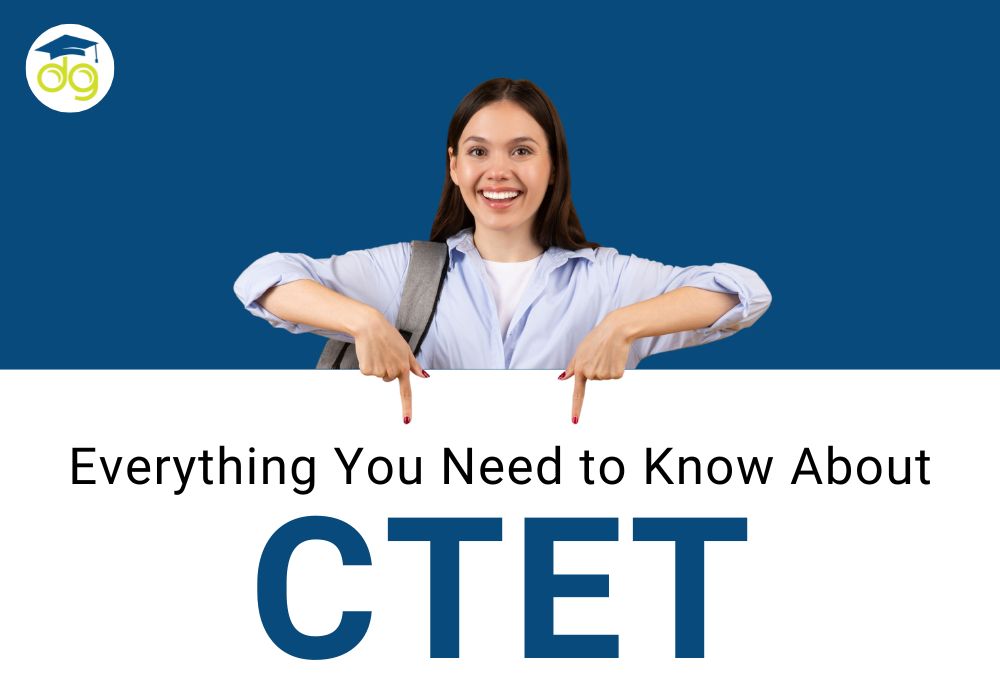"Everything You Need to Know About the CTET Exam: A Complete Success Guide for Aspiring Teachers"
Crack the CTET Exam with Confidence – Syllabus, Preparation Tips, and Mor
The Central Teacher Eligibility Test, or CTET, is one of the most important examinations for future teachers in India. The Central Board of Secondary Education (CBSE) designs the CTET. With the central government schools like Kendriya Vidyalayas (KVS), Navodaya Vidyalayas (NVS), and several other affiliated institutions, this is one of the most crucial test requirements aspiring teachers must take on. Be it primary level (Classes 1-5) or elementary level (Classes 6-8), the CTET exam makes sure you develop all the competencies and have the kind of knowledge base that will be required for a successful teaching experience.
This blog is a one-stop destination that will walk you through everything you would want to know about the CTET exam, including its structure, syllabus, preparation strategies, and important dates to keep in mind for CTET 2024.
What is CTET?
CTET is the Central Teacher Eligibility Test, which is a level of eligibility test to become a teacher. It is a screening tool for recruiting the central government teachers at school levels. Preparation for this kind of exam should ensure that applicants have a good deal of preparation in teaching various educational levels students, not only subject matter knowledge but also classroom management, child development understanding, and learning strategy design.
The CTET examination is divided into two papers as under:
Paper 1: For those who want to teach Classes 1-5 (Primary Level).
Paper 2: For those aspiring to teach Classes 6-8 (Upper Primary Level).
CTET Exam Pattern
The CTET exam is a multiple-choice exam with two papers, Paper 1 and Paper 2, which carry 150 questions each, with every question having one mark. The time for both the papers is 2.5 hours. Most importantly, there is no negative marking for the wrong answers as well; candidates can attempt all without the penalties for wrong answers.
Paper 1: For Classes 1-5, Primary Level
Paper 1 is for primary level teaching aspirants.
The subject has been divided into five sections:
Child Development and Pedagogy: 30 questions
It encompasses child development, teaching methods, and classroom strategies.
Language I (compulsory): 30 questions
This will test the competency in the second language selected.
Language II (compulsory): 30 questions
Language II is compulsory too, and 30 questions will test the proficiency in the second language, which has to be either English or Hindi.
Mathematics: 30 questions
Basic mathematical concepts and methodologies used in the teaching process.
Environmental Studies: 30 questions
Focus on environmental awareness and how it can be taught at the primary level.
Paper 2: For Classes 6-8 (Upper Primary Level)
Paper 2 is designed for candidates seeking to teach upper-primary classes. This paper has four parts:
Child Development and Pedagogy: 30 questions
Child development, cognitive psychology, and pedagogy to teach older children form the basis of this question paper.
Language I (compulsory): 30 questions
This is a language aptitude test in a language of their own choice.
Language II (compulsory): 30 questions
Another language proficiency test (usually a different language than Language I).
Subject-Specific Section: 30 questions
Candidates are given an option to choose a specific subject based on which stream they want to teach:
Mathematics & Science
Social Studies/Social Science
Each paper has a duration of 2.5 hours. Candidates have to answer all the questions in the given time.
CTET Syllabus Overview
The syllabus of the CTET is rich and sets evaluation of the candidate based on the teaching subjects, child psychology, languages, and many more
Paper 1 Syllabus (Primary Level)
Child Development and Pedagogy
Understanding the development of the child, like how children develop emotively, cognitively, and physically, and how those developments affect learning. This section also deals with classroom management and teaching.
Language Comprehension
The selected language (Hindi, English, or others) for accessing the reading and understanding capacity of the candidate.
Mathematics
Basic mathematical concepts like number operations, shapes, measurement, and data handling for the young learner. It also evaluates the ability to teach such concepts effectively.
Environmental Studies
Basic environmental science topics, social studies, and a focus on practical knowledge that may be integrated into teaching.
Paper 2 Syllabus (Upper Primary Level)
Child Development and Pedagogy
Focus on the cognitive development of older children and strategies for teaching larger groups effectively. This section is more advanced than Paper 1 and delves deeper into child psychology.
Language Comprehension
A test of language proficiency in the selected medium of instruction.
Subject-Specific Section
Candidates can opt for:
Mathematics & Science: Deals with methods of teaching scientific concepts and mathematics.
Social Studies/Social Science: Focus on history, geography, political science, and teaching methods for these subjects.
Preparation Tips for the CTET Exam
Success in the CTET exam depends on a perfect blend of domain knowledge, teaching aptitude, and effective exam preparation strategies. Here are some of the tips to help you start your preparation:
1. Know the Pattern of the Exam and the Syllabus
Before you begin your preparation, know the pattern of the CTET exam and the syllabus. Knowing the outline of the exam and what to expect will help you make an efficient learning plan.
2. Choose the Best Study Materials
NCERT books will be the most important book for study as the CTET syllabus has been more oriented toward NCERT books. In addition to this, other reference books and guides of Arihant, Wiley or R.S. Aggarwal also help specific sections such as Mathematics and Science and Social Studies.
3. Practice through Previous Year Papers and Mock Tests
Solving previous year's question papers and mock tests provides the feel of actual examinations. Therefore, it increases your time management besides pointing out specific areas to be practiced further.
4. Time Management
CTET is a time-bound examination. Therefore, you will develop your speed as well as precision while practicing papers under timed conditions. Practice solving as many papers as possible to develop a feel of being subjected to such pressure while attempting them.
5. Practice Daily
Constant repetition is the key to memorizing. Set aside some time during a week to revise and go over topics you have done so far, and reinforce learning.
6. Be Informed of Latest News
Update yourself regarding any changes related to the exam. That means checking the official CTET website for dates for application, dates for admit card, etc., along with other key announcements.
Conclusion: Kick-Off Your CTET Today!
The Central Teacher Eligibility Test is an important milestone for all those aspiring to become teachers in Central Government schools. With a good understanding of the exam pattern, proper study material, and consistent practice, the chances of passing the exam will considerably increase.
To make your preparation journey even more effective, we urge you to visit Skoodos Bridge — a one-stop platform for students and aspiring teachers. Whether you need study materials, expert advice, or tips to help you prepare for CTET, everything is accessible at Skoodos Bridge for your total success.
Start studying today, stay motivated, and utilize each session to its fullest potential. Dedication combined with the right guidance will ensure success in such a journey toward acing the CTET exam and the grand start of one's teaching career!
All the best in your preparations. The path to being an educator starts now.
Categories
Archives
Similar Posts

Music Therapy for Concentration: Playlists to Boost Focus While Studying
by Skoodos Bridge

Dopamine Hacking for Study Motivation: Neuroscience-Based Exam Prep
by Skoodos Bridge

Electric Vehicle Jobs: Top Mechanical Engineering Careers in EV Sector
by Skoodos Bridge

EdTech Careers After Engineering: Build Learning Apps & Startups
by Skoodos Bridge

Gaming Meets Medicine: VR Therapy Careers for NEET Aspirants
by Skoodos Bridge

WhatsApp Group Study: Boost Your Competitive Exam Preparation
by Skoodos Bridge

Drone Engineering Careers: Aerospace Pathways, Exams & Job Opportunities
by Skoodos Bridge

Instagram vs LinkedIn: Smart Social Media Strategy for UPSC Aspirants
by Skoodos Bridge

YouTube Shorts for Revision: Micro-Learning to Memorize Formulas Quickly
by Skoodos Bridge


Leave a Comment